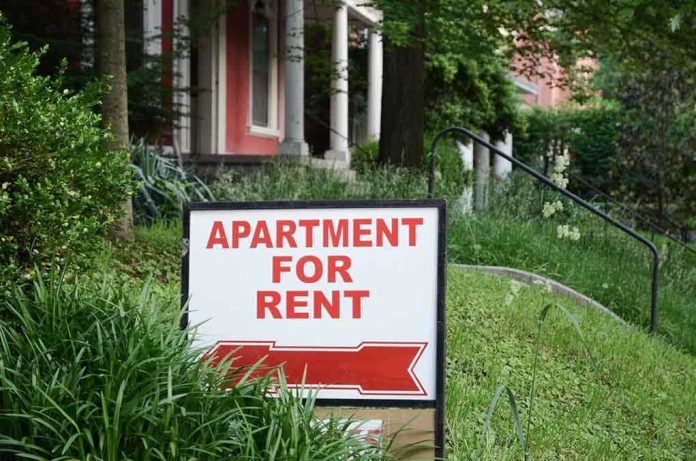
Scammers are exploiting Americans’ desperation for affordable housing, stealing over $600,000 this year by hijacking rental listings on social media—while Big Tech and government policy have left families increasingly exposed.
Story Snapshot
- Rental scams have surged in 2025, with over $600,000 lost as fraudsters use real listings and fake identities.
- Social media platforms like Instagram and TikTok are now primary vectors for these scams, preying on renters’ urgency.
- Victims are often pressured into paying deposits or fees for non-existent apartments, facing financial loss and housing insecurity.
- Authorities warn that the scale and sophistication of scams is at an all-time high, demanding greater vigilance and stronger platform accountability.
Rental Scams Surge as Social Media Becomes a Hotbed for Fraud
In 2025, Americans searching for housing are facing a new epidemic: sophisticated rental scams that have already cost victims more than $600,000 this year. Fraudsters are hijacking legitimate apartment listings, posing as real estate agents, and advertising artificially low rents to lure in desperate renters. Social media platforms—once hailed as tools for connection—are now the primary battleground, with Instagram and TikTok enabling scammers to reach vulnerable families at unprecedented scale.
Reports to the FBI show a dramatic rise in complaints linked to rental fraud on social media, with 130 cases and $600,000 in reported losses by mid-2025 alone. Scammers typically steal images and details from authentic listings, then contact renters directly, pressuring them to send application fees or deposits before even viewing a property. Many victims, squeezed by a tight housing market and rising costs, feel compelled to act quickly—only to discover the apartment does not exist or was never available. The emotional toll is severe, compounding financial hardship with housing instability.
How Scammers Exploit the Biden-Era Housing Crisis and Digital Shift
The roots of this crisis go back years, but the problem has exploded alongside the rise of online apartment hunting, a trend fueled by pandemic-era restrictions and the ongoing U.S. housing shortage. With vacancy rates at historic lows and demand for rentals outpacing supply, scammers prey on families and young adults searching for affordable options. In 2025, 43% of renters report encountering fake listings during their search—a staggering figure that highlights the scale of the problem. The median loss per victim is $1,000, but some lose far more, putting their financial security and housing prospects at risk.
Social media’s lack of robust verification and accountability has made it a favorite tool for these criminals. Platforms profit from high engagement but often lack effective mechanisms to prevent fraudulent listings or impersonation. Real estate professionals, whose reputations are at stake, have also become victims, as their legitimate listings and identities are stolen for scam operations. Law enforcement agencies, meanwhile, are forced to play catch-up, investigating after the fact and struggling to keep pace with the volume and sophistication of online fraud.
Authorities and Industry Leaders Respond with Warnings, but Risks Remain High
In response to this alarming trend, the FBI and consumer protection agencies issued new warnings in November 2025, urging renters to verify listings, avoid upfront payments, and be wary of deals that seem too good to be true. Real estate industry experts stress the importance of in-person verification and caution against sending money before physically seeing a property. However, with scammers constantly evolving their tactics, these measures provide only partial protection. The multifamily and rental housing sectors now face increased operational risks and higher costs for fraud prevention, while platforms may need to invest in stronger verification tools to restore public trust.
Industry analysts point out that the housing crisis and digital shift have created a “perfect storm” for rental fraud, and call for improved digital literacy among renters. Some experts argue that platforms must bear more responsibility for vetting listings, while others emphasize personal vigilance as the first line of defense. The consensus is clear: without stronger action from both tech companies and policymakers, Americans will remain vulnerable to scams that threaten not just their wallets, but their fundamental right to safe and secure housing.
Short-term impacts of these scams include direct financial losses, emotional distress, and housing insecurity for victims. In the long term, trust in online rental platforms may erode further, driving calls for new laws or more aggressive platform policies. As the Trump administration continues to prioritize law and order and consumer protection, Americans hope for decisive action that puts families’ interests ahead of Big Tech profits and failed past policies. Until then, vigilance and common sense remain the best defense against an epidemic of digital deception that threatens the American dream.
Sources:
The $1,000 House Hunt Nightmare: How Rental Scams Are Destroying Dreams and Bank Accounts in 2025
How Multifamily Operators Can Protect NOI from Rental Scams
Apartment scams: Renters lose $600,000 as social media becomes a scammer’s paradise
New warning issued over apartment listings as renters lose $600K
Apartment scams on the rise as renters turn to social media

















